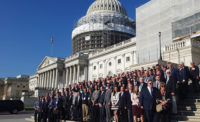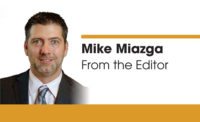Being the voice and advocate for an industry is one of the primary roles of any association. In fact, most associations were formed to allow industry businesses, professionals and even competitors to band together into a more cohesive and effective force to advance industry interests with one collective voice.
Last month, you heard about the American Supply Association’s advocacy effort in the codes and standards arena where over the past year the association has started to lend its voice and exerting influence when codes and standards are being debated.
A robust arm of the association’s advocacy programs has long been its legislative and regulatory advocacy effort toward building a strong and effective voice to protect industry issues in our nation’s capital. Unfortunately, most in the industry do not see the effort put into protecting the interests of those building a business or career. The following is a look at a “Week in Washington,” following ASA’s advocacy efforts to advance the voice of the wholesale-distributor in our nation’s capital.
Five Days in September
With the prospect of a looming government shutdown due to the lack of passing the a federal budget, ASA had a busy week with a heavy meeting schedule Sept. 13-17 as legislators were eager to get a budget agreement in and move on to historic issues such as comprehensive tax reform and infrastructure investment, two issues that impact industry businesses.
Sept. 13
ASA is a member of the National Association of Manufacturing’s Council of Manufacturing Associations, and as a coalition member, ASA and our members have gained access to thought leaders in manufacturing, specifically as a member of NAM’s Education and Workforce Policy Committee. At this meeting, the group discussed the White House and Department of Labor’s taskforce on apprenticeships and possible strategies to impact efforts to incentivize businesses to take part in apprenticeships, perhaps with tax incentives, regulatory relief or wage subsidies.
Sept. 14
ASA led an industry consortium in a meeting at the White House as we shared with members of the president’s staff our plans for rebuilding our workforce. Joining with PHCC, ASA led manufacturers, distributors and plumbing professionals into the White House to lay out our vision for restoring the ranks of skilled workers, looking toward the next generation of plumbers, as well as other skilled construction workers.
Sept. 19
Tuesday mornings are traditionally reserved for a standing meeting of the Marketplace Fairness Coalition, where we discussed ongoing legislative roadblocks to enacting changes to sales-tax law. In addition, we discussed the timeline for the recent case dealing with this issue: South Dakota v. Wayfair.com. ASA and others drafted an Amicus brief to the Supreme Court, which is presently deciding whether to hear this case.
Tuesday afternoon, we returned to NAM to take part in the Energy and Natural Resources Committee to meet with the lead counsel of the House Energy and Commerce Committee and its fall agenda. At that meeting, we received a briefing from the assistant administrator of the United States Environmental Protection Agency for Air and Radiation for the Bush administration, who walked us through the state of play of a number of rule makings currently underway and being held up by the courts and Trump EPA.
Sept. 20
ASA is a founding member of the Energy Equipment and Infrastructure Alliance (EEIA), advocating for investment and regulatory relief to increase our nation’s energy development. At this meeting, hosted by the Edison Electric Institute, the CEO of EEI briefed the coalition members on their agenda and investments in electric delivery. In addition, the Associated General Contractors shared the work they’re doing, like ASA, to promote the trades and attract the next generation into our workforce.
Sept. 21
The SAVE LIFO Coalition convened at the National Association of Wholesalers (NAW). With tax reform nearer than ever, it was critical that groups like ASA that represent so many concerned stakeholders relying on LIFO gather and exchange intelligence. With rumors growing stronger that a draft would be introduced soon, we discussed and took assignments to have as many last-ditch conversations to keep a repeal out of the draft. Through our meetings, we believe our support in the Senate is much weaker than the House, so keeping it out of the House version gives us more strength to fight its possible introduction in the Senate.



